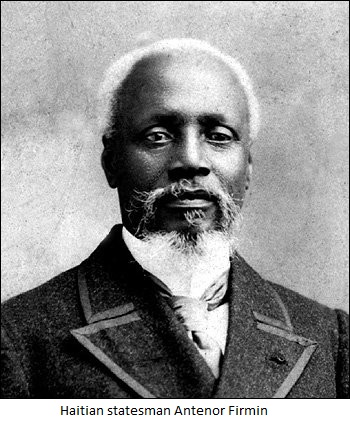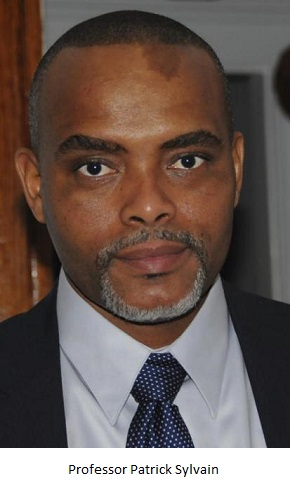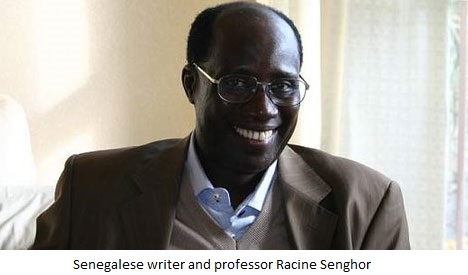Special to CSMS Magazine
As Professor Patrick Sylvain continues his journey in Sub-Saharan Africa, he was able to meet many dignitaries, intellectuals and ordinary folks. To his surprise, Haiti still retains an astonishing admiration among educated Africans who see in the Caribbean nation their “diasporic African country.” It seems like the whole world understands the historic role Haiti played in rewriting the ugly narrative of slavery—everyone, but the Haitians leaders themselves who understand one grotesque and unpatriotic logic: greed and total submission to foreign dictates. In this article that follows, Prof. Sylvain writes candidly about his meeting with Senegalese writer, Racine Senghor and about his personal reflections vis-à-vis the current, precarious position Haiti occupies in the world today and how it is now viewed as a result of its predicament.
_____________________________________________________________________
Members of the intellectual class that I have met in Senegal have, univocally, praised Haiti’s designation as the first black republic in the world, and have recognized her kinship as a diasporic African country. These recognitions, however, are routinely followed by lamentations of the tragedy that Haiti has become in her fight to establish a democratic society that would center on human freedom. A former beacon of the Black world, she is now something quite different.
It was in this same spirit of kinship that the former President of Senegal, Abdoulaye Wade, passed a presidential decree welcoming and offering full scholarships to over 160 Haitian students who were studying at the university level, soon after the January 2010 earthquake. Among the hosts who welcomed the young Haitian students was Racine Senghor, a professor of literature, literary critic, and writer who had 12 Haitian students taking residence at his home.
At Plateau, Dakar, on a Friday afternoon in July 2014, in Racine Senghor’s living-room, we talked about several issues concerning Haiti, the black diaspora, the African continent, and pluralistic democracies in the context of a Senghorian-imagined world—where humans would be at the center of auto-productivity for the safekeeping of the planet, and where each civilization would have something to contribute toward making the human race more knowledgeable, more democratic, and more welcoming of one another. In our conversation, we latched onto Leopold Sedar Senghor’s (1909-2001) theory of “enracinement” (rootedness), and how, without such rootedness, progress and democracy would be superfluous. We acknowledged that one of the enemies of enracinement is globalization, especially in a capitalistic market where products replace rootedness, distorting human historical relations to places and sense of self. Of course, one of the disturbing phenomena of globalization relating to the lack of rootedness is depigmentation.
In Senegal, and throughout the black world, skin bleaching is ubiquitous. It is the ultimate blow to the Négritude that Senghor, Césaire, and many others believed in and fought for. Haitian, Anténor Firmin, wrote De l’égalité des Races Humaines in 1885 to scientifically show that race was a social construct, and that all of the so-called “races” were biologically equal. This launched the significant movement among Francophone Africans and those of the diaspora to reject notions of French superiority and embrace blackness as ideal, known as Négritude, and as a philosophy, it also helped in dealing with colonial trauma.
After my meeting with Racine Senghor, when I returned at my rented apartment in Dakar, I began to ponder about the significance of early globalization on the “New World”. Globalization had, in effect, wiped-out millions of Tainos and the other indigenous peoples of the Caribbean, as well as other native groups throughout the Americas. Globalization brought human chattel across oceans for enslavement—fracturing families, livelihoods, and so much more. As a result of her attempt to put down her own roots in the name of liberty, Haiti is still paying a significant price.
 The desire for liberty is rooted in the patterns of thought and behavior of human beings, as each human wants to live in accordance with the environment that nurtures and does not oppress. Any child newly acquiring speech could be known to shout, “Leave me alone!” It seems clear, that no one, who is of sane mind, wants to be in or remain in bondage. That is why, regardless of forces used or techniques of control, humans will almost always find a way to break free.
The desire for liberty is rooted in the patterns of thought and behavior of human beings, as each human wants to live in accordance with the environment that nurtures and does not oppress. Any child newly acquiring speech could be known to shout, “Leave me alone!” It seems clear, that no one, who is of sane mind, wants to be in or remain in bondage. That is why, regardless of forces used or techniques of control, humans will almost always find a way to break free.
If indeed, we are so wired as to desire liberty, it is interesting to witness ubiquitous attempts to constrain it. Why has the United States, the promoter par excellence of freedom, invaded, occupied, and warred with so many? US involvement has often been under the guise of establishing liberty and freedom, only to suppress certain freedoms when these countries are subsequently occupied—thus, giving the world some of the worst dictators, from Africa to the Americas. It seems a bit contradictory, futile even, for governments and corporations to be mired in the business of control. It is widely observed that, big businesses and corporations remain the most important players in the consolidation process in emerging “democracies” irrespective of the challenges confronting them as the masses seek to be represented by viable institutions and nation-minded politicians. Yet, despite the constant demands for transparency and greater autonomy, that is exactly what governments and corporations do: control. Control in order to thwart the democratic process and a given country’s autonomy. For corporations, what matters is not democracy but control of the market.
In the globalized world, where the promotion of business is central to capitalism, control means having access to resources beyond one’s frontier. Rootedness is the ultimate challenge to market driven globalization that seeks to erase frontiers and establish a molded consumer subject. Globalization has been with us for a long time, and it is unavoidable; however, as a people who have long suffered from exploitation, we must reject further humiliation by preventing the large scale dumping of various forms of “beauty” chemicals into our markets that are essentially uprooting our essence and fermenting self-alienation. In this view, it is imperative for governments to work at developing a citizenry that is responsive to the desires of governments and corporations, and is not rooted. However, one must realize that the rootedness of an individual within a nationalistic or religious framework that excludes or encroaches on the liberty of others, is, according to the Senghorian understanding of enracinement, a false rootedness. Then, how does one maintain the rootedness of a human being within the auto-productivity of liberty for the collective?
When President Joseph Martelly and Prime Minister Laurent Lamothe, announced that “Haiti is open for business”, I cringed, knowing the vulnerability of the Haitian people who are, and have historically been, hyper-exploited by Western corporations. Certainly, one would agree, developments that are neither detrimental to the environment, nor detrimental to the existence of human beings, can be considered good. However, it is always in the marginalized spaces that the vast majority of Haitians find themselves, and Haiti’s relationship with the United States has always been lopsided and paternalistic. What kind of business can the West bring to Haiti that would be structurally beneficial for the country? Haiti, battered, weak, unprotected, and unwanted by the world community, cannot be expected to be a business partner due to its extreme levels of poverty and class divisions. What about liberty then?
Small-scale Haitian farmers and rural families are being forced to sell land in order to become low-wage workers in tax-free zones. Laborers in the Caracol Industrial Park, who have no right to unionize, can only consume the food that is provided for sale by Dominican companies. Haitian workers are uprooted from their own soil, and are hyper exploited because they are the cheapest and least educated workers in the Americas. What liberty? When the expression of that liberty is forcibly tied to a disparaging wage (less than $5 per day), and where any semblance of “upward mobility” is simply impossible, liberty cannot exist.
If business and developments are not linked to needed structural improvements to the lives of the majority of Haitians, then where does “Haiti is open for business” leave us? On the one hand, there is liberty, where one’s physical activity in the world is not constrained, and one can be recognized as a free subject in space and time. On the other hand, there is rootedness, where the self as a subject is invulnerable to the external forces that aim to configure one’s experience based on the desire of the external entity.
Liberty and rootedness should not be contradictory or conflicting. One’s liberty and rootedness should benefit his/her country and humanity, but not be to the detriment of others.
Through the instantly gratifying media, the psychological invasion of the exploited subject (the dark skinned people of the world), they have unfortunately commercialized hip-hop culture, following the glorification of lightness as desired aesthetics. This has contributed to the pushing for the supremacy of whiteness by glorifying curvy White women, Latinas and light skinned Black women; thus the praises that so many writers, thinkers and musicians evoked to the Black women are becoming stale when the essence of black beauty is being attacked on so many fronts and skin-bleaching is becoming the offered answer to black acceptance. What liberty and what rootedness?
As a former slave society, while striving towards development, we must be mindful of how we interface with the West. We must know all of the parameters of business developments, because, unfortunately, many Western countries and companies have long histories of deceit. Haiti, in her quest to be “open for business”, must be rooted in her own liberty, and the “enracinement” of her people must be done through critical education. In this way, our Négritude will be solidly rooted in the history that sought to establish dignity the moment our shackles of slavery were broken.
 Note: Patrick Sylvain is a poet, writer, translator, scholar, and a faculty at Brown University’s Center for Laguage Studies. Sylvain is also a 2014 Robert Pinsky Global Fellow at Boston University Creative Writing Department. He is published in several anthologies, academic journals, books, magazines and reviews including: Agni, Callaloo, Caribbean Writers, SX Salon, Haiti Noir, Human Architecture: A Sociology Journal, Poets for Haiti, Fixing Haiti and Beyond, The Butterfly’s Way, Tectonic Shifts, The Best of Beacon Press, The Oxford Book of Caribbean Verse. Recently featured in: PBS NewsHour, NPR’s «Here and Now» and «The Story», he was also a contributing editor to the Boston Haitian Reporter. Sylvain’s academic essays are anthologized in several edited collections, including: “The Idea of Haiti: Rethinking Crisis and Development,” Edited by Millery Polyné; “Politics and Power in Haiti,” Edited by Paul Sutton and Kate Quinn.
Note: Patrick Sylvain is a poet, writer, translator, scholar, and a faculty at Brown University’s Center for Laguage Studies. Sylvain is also a 2014 Robert Pinsky Global Fellow at Boston University Creative Writing Department. He is published in several anthologies, academic journals, books, magazines and reviews including: Agni, Callaloo, Caribbean Writers, SX Salon, Haiti Noir, Human Architecture: A Sociology Journal, Poets for Haiti, Fixing Haiti and Beyond, The Butterfly’s Way, Tectonic Shifts, The Best of Beacon Press, The Oxford Book of Caribbean Verse. Recently featured in: PBS NewsHour, NPR’s «Here and Now» and «The Story», he was also a contributing editor to the Boston Haitian Reporter. Sylvain’s academic essays are anthologized in several edited collections, including: “The Idea of Haiti: Rethinking Crisis and Development,” Edited by Millery Polyné; “Politics and Power in Haiti,” Edited by Paul Sutton and Kate Quinn.


